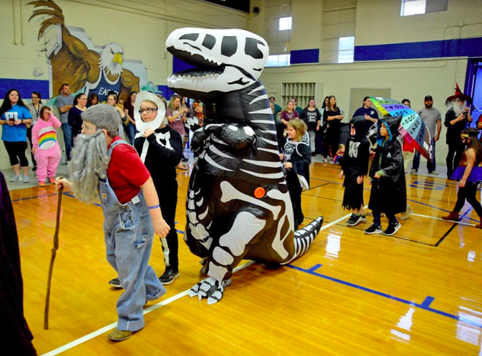|
by: Ryan Fitzgerald  Earlier this week, I was talking to a friend of mine who works on the announcements here at Glenelg. I was asking him about what Halloween songs they would play, if they would dress up in costumes, or even if I should expect to hear a Halloween related pun at the end of the announcements. His response floored me: “We can’t do any of that...we aren’t allowed to reference Halloween on the announcements.” At the time, I was oblivious about the current situation involving Halloween, so I unmindfully asked my friend, “What’s wrong with Halloween?” He then went on to explain that he was told the imagery of werewolves, vampires, and ghosts is too hardcare for some, and is sometimes considered “occultish" or “satanic.” Halloween may seem like one of the most innocent and unproblematic holidays. Dressing up in costumes? Scary movies? Candy? Ray Parker, Jr.? It turns out that the meaning of the holiday goes deeper than I had originally thought. A simple Google search will tell you that Halloween is based on Celtic traditions. Villagers would light bonfires and welcome spirits of the dead and exclude any evil ones. In other words, Halloween has religious overtones. After doing a bit of research, I found many reports involving elementary schools banning the celebration of Halloween for this reason. Even here in Howard County, some of our elementary schools banned the celebration of Halloween when students were still in virtual settings. Jonathan Davis, principal of Cradlerock Elementary School, for example, released a statement in 2020, saying “the decision has been made to not hold Halloween activities during the virtual instructional day this year or in the future.” There are also many parents who believe that celebrating Halloween at public schools is a violation of the First Amendment. Because Halloween’s roots involve religion, some believe that schools are taking away the right for students to have religious freedoms. When I was in elementary school, we had a tradition of dressing up in our costumes and having a parade outside. We would sing songs and maybe watch a Charlie Brown special. Of course, 7-year-old Ryan wasn’t thinking about the religious background of the holiday, but the question remains: Do these true meanings of Halloween make this holiday too inappropriate for school? And furthermore, if these meanings of Halloween have always been there, why is it just now starting to become problematic to celebrate it in schools? While many people, especially young elementary school students, are most likely unaware of these meanings of Halloween, it seems that the times we’re in right now are calling for this holiday to be left as a private celebration. It also seems that as time goes on, less and less schools will be allowing Halloween to be celebrated. And whether students and parents care about this direction, one thing’s for sure: There’s no point in creating conflict simply because your child isn’t able to dress up in their Mario costume at school. Comments are closed.
|
Archives
May 2024
|